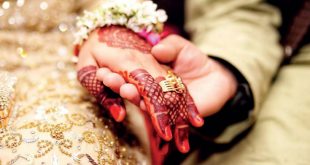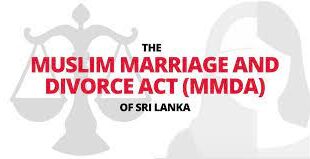Reforming the Muslim Marriage and Divorce Act (MMDA) has become an endless saga of committees and consultations, more to satisfy the political addenda of governments, parliamentarians and Muslim vote-bank managers than to make Muslim matrimonial matters keep pace with changing circumstances of Sri Lanka and its Muslim community. Between the time when Justice Saleem Marsoof Committee (JSMC) submitted its findings and recommendations to the then woman Minister of Justice Thalatha Atukorale in 2018, and until now, the Muslim religious constituency has remained the chief bulwark against delivering justice to Muslim women. SMC report carried a number of progressive recommendations to benefit these women, such as raising the marriageable age to eighteen, requirement of bride’s consent for marriage, appointment of women Quadis and so on. But the intervention of All Ceylon Jamiyatul Ulema (ACJU), a men-only organization of mullahs, sabotaged that report by canvassing against it. It warned Muslim parliamentarians who were facing an election at that time not to approve it, and the surrender of those leaders left JSMC report gather dust in the parliamentary archive.
It was that act of sabotage which provided the opportunity to an ultranationalist Buddhist priest and parliamentarian, Athuraliya Rathana Thera, to introduce a Private Bill in the legislature calling for One Country One Law (OCOL). That call became the trump card in the presidential electioneering campaign of the Sinhala Buddhist nationalist candidate, Gotabaya Rajapaksa (GR). In 2021, a couple of months before he was thrown out, GR appointed a task force headed by another controversial monk, Ven. Galagoda atte Gnanasara Thera, to make recommendations so that OCOL could be implemented. Recently, GR’s successor Ranil Wickremesinghe (RW), with an eye on garnering Muslim support for his own political agenda, has rejected Gnanasara’s report and bringing a sigh of relief to ACJU and its politicians.
However, the controversy continues. One of the most contentious issues relating to Muslim marriages is Islam’s tolerance for polygamy. Even JSMC did not want to abolish polygamous marriages, but allowed it to continue under certain conditions. Lately, an “Advisory Committee on Muslim Law Reforms”, consisting of seven men and two women, appointed by the Ministry of Justice has done the same, with seven members voting for and two against polygamy. One need not be a rocket scientist to detect who voted for and who against. Inside information reveals that all them supported polygamy under so-called “stringent conditions” while the two women opposed it under any condition. Even among those seven one or two had expressed reservations but did not have the guts to confront the conservative elements that were present in that committee.
There are two things that raise serious concern in this regard.One is in relation to the composition of this committee. Almost one half of the Muslim population in this country consists of women, and they are the ones responsible for bringing to this world the other fifty percent also. Given this eternal genetic fact, how could one justify the appalling under-representation of women in this committee? Is the Muslim community bereft of educated women? Like the two women lawyers appointed already, there are plenty of able, qualified and erudite others, thanks to the country’s free education, who could educate the men on how Muslim women are suffering and becoming the ultimate victims of polygamous marriages. Apart from lawyers and activists there are among them professors and highly qualified scholars who could present a different perspective on the issue. Why were they ignored by the minister is a mystery? Isn’t the national legislature itself an embodiment of this gender discrimination?
Like women in other communities, Muslim women of today are an economically independent and resourceful other half, and many have taken the role of breadwinner in their families. Why should they be subjected to the dictates of the masculine half? Whatever the conditions imposed upon polygamy and however strict those conditions are to be followed, it is common knowledge that in a male chauvinist society women receive the lower end of any bargain. At least they must be adequately represented in any committee that decides on such a vital issue as marriage, divorce and type of marriages.
The second area of concern could become bitterly controversial. The winning argument that permits polygamy to continue is that it is allowed in the Quran, and that the words of the Quran are eternal. This is the contention of orthodoxy and the committee referred to also has taken the same view without any critical review of the time and context of those words. There are modernist scholars who argue today that Quranic verses which are strictly religious in nature are eternal but those relating to mundane matters like economic and social relations and their institutions are contextual. It was that renowned Muslim philosopher and sociologist, Fazlur Rahman (1919-1988), for example, who set the golden rule that “contextualization of the text and textualization of the context” must go hand in hand in order to make Islam a way of life for all times. It was along that line the theological instrument of ijtihad or independent reasoning was developed since the time of the Prophet of Islam. That door is said to have been controversially closed after the 12th century with the reassertion of orthodoxy. This is why Muslim religious conservatives and neo-fundamentalists of today have nothing to do with ijtihad and clinging on to taqlid or imitation. They therefore disapprove the contextualization argument. However, even they had embarrassingly contextualized Quranic verses whenever pushed to a corner to defend themselves. A classic instance was when Islamist Jihadists started quoting verses from the Quran to justify their barbaric killings of non-Muslims after 2000. When critics condemned the jihadists and quoted the same verses and argued that Quran itself was encouraging barbarism, terrorism and violence, orthodoxy immediately came to the defense and countered that those verses were revealed at a particular time in a particular context and that time and context have lapsed now. What a volte-face?
Shouldn’t the same argument be applied with reference to polygamy also? Permission for polygamous marriages was granted at a time when Arab society was at an underdeveloped stage of civilization where women were used as chattels and sexual objects to satisfy men’s carnal desires. Arabs in that society had limitless number of wives. Islam actually cut down that number and limited it to just four but favouring one to be the norm. In that context that itself was a revolution. Yet, the rich and the powerful opted for the plural justifying with the Quran. The harems of Muslim caliphs are a historical testimony to this abuse. Quranic restrictions were openly flouted.
That society has changed today and the status of women also has changed along with it, thanks to the freedom and respect the Quran itself has granted to women. These changes and the elevated status of Muslim women should be understood and their views should receive greater weightage when deciding on marriage issue. More than the literal meaning of the scripture the intention behind each of its instructions should be understood. That requires a good grasp of the critical stock of knowledge that has developed independent of the Quran. Unfortunately, today’s madrasas, their pedagogues and institutions which control like ACJU suffer from a great deficit in this area.
Before accepting the recommendations on polygamy, the Minister of Justice must make arrangements to organize island wide discussion groups for Muslim women to participate and represent their concerns on this matter. Justice to those women demands that arrangement.
*Dr. Ameer Ali, Murdoch Business School, Murdoch University, Western Australia
Post Disclaimer | Support Us
Support Us
The sailanmuslim.com web site entirely supported by individual donors and well wishers. If you regularly visit this site and wish to show your appreciation, or if you wish to see further development of sailanmuslim.com, please donate us
IMPORTANT : All content hosted on sailanmuslim.com is solely for non-commercial purposes and with the permission of original copyright holders. Any other use of the hosted content, such as for financial gain, requires express approval from the copyright owners.
 Sri lanka Muslims Web Portal Sri Lanka Muslims News Center
Sri lanka Muslims Web Portal Sri Lanka Muslims News Center
 Donate
Donate


